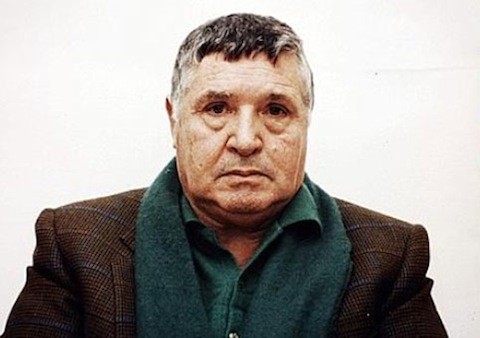
I somehow doubt we’ll ever hear the full story regarding what Pakistan’s intelligence apparatus knew about Osama bin Laden’s whereabouts these past five years. It is totally naïve to think they knew naught, of course; the big question is who in the spook food chain was in on the conspiracy, and (perhaps most important) what they stood to gain from keeping the matter under wraps.
My pessimism about the eventual resolution of these mysteries stems from past experience. Time and again, big-name fugitives have been found hiding in plain sight, obviously having enjoyed the protection of powerful figures. Yet no one ever seems to suffer any consequences for this sort of aiding and abetting—to mod an infamous Leona Helmsley quote, only the little people get pinched for helping evildoers. My favorite example of this truism pertains to the case of Salvatore Riina, the onetime boss of the Sicilian Mafia, who made bin Laden’s time on the lam seem like child’s play. Bin Laden, at least, reportedly kept to himself indoors; when he wasn’t luxuriating in his massive hilltop villa, Riina milled about downtown Palermo at will:
During the 23 years that Salvatore Riina lived as a fugitive, he married in the church, fathered four children born in the same clinic, circulated freely in Palermo and ruled as dictator over the Mafia.
That freedom ended with his arrest in the Sicilian capital Friday. Amid the banner headlines and expressions of joy, many Italians asked how the country’s most wanted man could have avoided capture so long…
Asked why it took so long to capture Riina, Carabinieri commander Antonio Viesti said he was protected by a “network of cover.”
It’s easy to see why the members of that network were never brought to account: They likely controlled the very apparatus charged with investigating the affair. I have no doubt that the people complicit in protecting bin Laden wield similar authority in Pakistan. In fact, those who provided cover for bin Laden will likely be the same officials who now crow the most loudly about the benefits of his demise. In corrupt systems such as early 1990s Sicily or modern-day Pakistan, the elites who last are those most adepts at playing both sides of the coin.


Jordan // May 3, 2011 at 11:15 am
It was pointed out to me yesterday that ISI officials also had a strong incentive to keep Bin Laden from being captured because that meant large amounts of American money flowing into the country. It can be difficult to get out of incentive traps like that.
Brendan I. Koerner // May 3, 2011 at 11:27 am
@Jordan: Interesting, that hadn’t occurred to me. I’d be curious to know what percentage of our counter-terrorism aid ended up in the pockets of ISI pooh-bahs, and what they used the cash for. Wouldn’t surprise me at all if some of it went toward funding the Mumbai attacks and other Kashmir-related activities.
As an aside, I’ve yet to read a really good piece that lays out the ISI’s motivations, as well as the reason why it seems capable of operating as an autonomous entity within the Pakistani government. Apart from settling the Kashmir controversy in Pakistan’s favor, what are the organization’s long-term goals? It’s too often caricatured as a sort of Dr. Evil-like entity that simply wants to undermine Western interests. But there has to be more to the tale.
Jordan // May 3, 2011 at 2:40 pm
I’ll admit to not knowing a lot either, but it seems like paranoia about India plays a pretty large role. It was almost shocking last year when Pakistani generals were unwilling to shift many troops from the India/Pakistan border to support the campaign against insurgents in the tribal regions. Given the situation, it seems highly unlikely that India would have even dreamed of invading Pakistan, but the fear is still great enough to influence their actions to that degree.
scottstev // May 4, 2011 at 11:42 am
I remember reading a good article in the New Yorker during the protest movement to oust Musharraf. One of the quotes was to the effect of ‘Civilian rule was never as good as promised, while military rule was never as bad as feared.’
A major factor to consider is that the Military in Pakistan is the most stable institution and plays a tremendous political role. So there is a conflict between remaining effective (in order to maintain their prestige) and retaining and expanding their political and economic power (several of the largest companies are wholly owned by the military). So many choices that might seem irrational from a self-defense perspective, make sense from an internal political view.
Makes me glad to live in a place with a professional army controlled by civilians. Having the military concentrate exclusively on defense from external enemies simplifies things greatly.